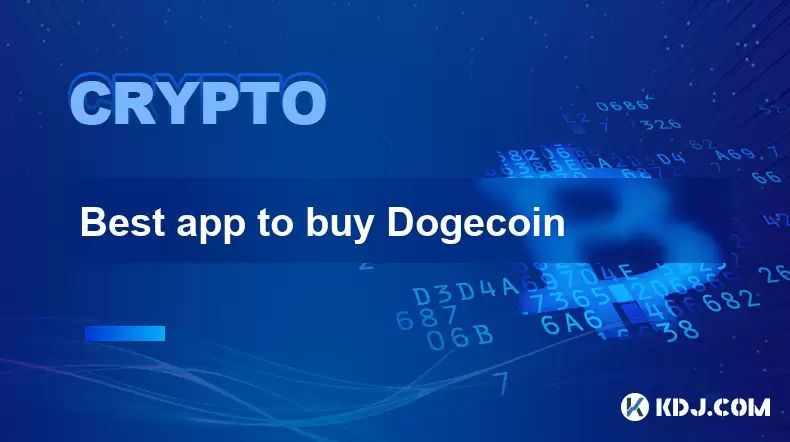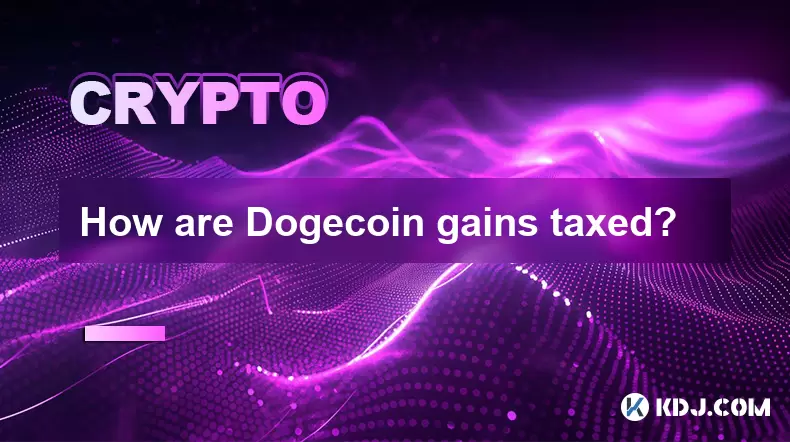-
 bitcoin
bitcoin $87959.907984 USD
1.34% -
 ethereum
ethereum $2920.497338 USD
3.04% -
 tether
tether $0.999775 USD
0.00% -
 xrp
xrp $2.237324 USD
8.12% -
 bnb
bnb $860.243768 USD
0.90% -
 solana
solana $138.089498 USD
5.43% -
 usd-coin
usd-coin $0.999807 USD
0.01% -
 tron
tron $0.272801 USD
-1.53% -
 dogecoin
dogecoin $0.150904 USD
2.96% -
 cardano
cardano $0.421635 USD
1.97% -
 hyperliquid
hyperliquid $32.152445 USD
2.23% -
 bitcoin-cash
bitcoin-cash $533.301069 USD
-1.94% -
 chainlink
chainlink $12.953417 USD
2.68% -
 unus-sed-leo
unus-sed-leo $9.535951 USD
0.73% -
 zcash
zcash $521.483386 USD
-2.87%
How to store Dogecoin? Do you need a dedicated wallet?
For safe Dogecoin storage, use hot wallets like Dogecoin Core for frequent transactions and cold wallets like Ledger for long-term security.
May 10, 2025 at 09:57 pm

Storing Dogecoin safely and efficiently is a crucial concern for anyone involved in the cryptocurrency space. Dogecoin, like other cryptocurrencies, requires secure storage to protect your investment from theft and loss. In this article, we will explore various methods to store Dogecoin, including whether you need a dedicated wallet and how to set one up.
Understanding Dogecoin Storage Options
Before diving into the specifics of storing Dogecoin, it's important to understand the different types of storage options available. Cryptocurrency storage can be categorized into two main types: hot wallets and cold wallets. Hot wallets are connected to the internet and are more convenient for frequent transactions, whereas cold wallets are offline and provide higher security for long-term storage.
Do You Need a Dedicated Wallet for Dogecoin?
The question of whether you need a dedicated wallet for Dogecoin largely depends on your specific needs and how you plan to use the cryptocurrency. If you are actively trading or frequently using Dogecoin for transactions, a dedicated wallet can be beneficial. However, if you are holding Dogecoin for the long term, a multi-currency wallet that supports Dogecoin might suffice.
Types of Wallets for Storing Dogecoin
There are several types of wallets that can be used to store Dogecoin. Each type has its own advantages and disadvantages, and the choice depends on your security needs and usage patterns.
Hot Wallets
Desktop Wallets: These are software programs installed on your computer. Examples include Dogecoin Core and MultiDoge. Desktop wallets offer a good balance between security and convenience, but they are vulnerable to malware and hacking if your computer is compromised.
Mobile Wallets: These are apps designed for smartphones and tablets. Dogecoin can be stored in mobile wallets like DogePal and Coinomi. Mobile wallets are convenient for everyday transactions but are less secure than cold storage options.
Web Wallets: These are online services that allow you to store and manage your Dogecoin through a web browser. Examples include Coinbase and Binance. Web wallets are the most convenient but also the least secure, as they are more susceptible to hacking and phishing attacks.
Cold Wallets
Hardware Wallets: These are physical devices that store your Dogecoin offline. Popular hardware wallets that support Dogecoin include Ledger and Trezor. Hardware wallets offer the highest level of security but are more expensive and less convenient for frequent transactions.
Paper Wallets: These involve printing out your Dogecoin private keys and public addresses on a piece of paper. Paper wallets are highly secure as long as they are kept in a safe place, but they can be inconvenient to use for transactions.
Setting Up a Dogecoin Wallet
Setting up a wallet to store Dogecoin involves several steps, depending on the type of wallet you choose. Here, we will go through the process of setting up a Dogecoin Core wallet, a popular desktop wallet.
Download Dogecoin Core: Visit the official Dogecoin website and download the Dogecoin Core software for your operating system.
Install the Software: Follow the installation instructions to install Dogecoin Core on your computer.
Launch Dogecoin Core: Once installed, launch the Dogecoin Core application. The software will begin to synchronize with the Dogecoin blockchain, which may take some time.
Create a New Wallet: Click on 'File' and then 'New Wallet' to create a new wallet. You will be prompted to choose a location to save your wallet file and to set a strong password.
Backup Your Wallet: After creating your wallet, it's crucial to back it up. Click on 'File' and then 'Backup Wallet' to save a copy of your wallet file in a secure location.
Receive Dogecoin: To receive Dogecoin, click on 'Receive' and generate a new address. You can share this address with others to receive Dogecoin.
Send Dogecoin: To send Dogecoin, click on 'Send,' enter the recipient's address, the amount you want to send, and your password. Confirm the transaction to complete the process.
Security Measures for Storing Dogecoin
Regardless of the type of wallet you choose, implementing robust security measures is essential to protect your Dogecoin. Here are some key security practices:
Use Strong Passwords: Always use a strong, unique password for your wallet and change it regularly.
Enable Two-Factor Authentication (2FA): If your wallet supports 2FA, enable it to add an extra layer of security.
Keep Software Updated: Regularly update your wallet software and operating system to protect against vulnerabilities.
Use Cold Storage for Large Amounts: If you are holding a significant amount of Dogecoin, consider using a hardware or paper wallet for added security.
Beware of Phishing Attacks: Be cautious of emails or websites that ask for your private keys or wallet passwords. Always verify the authenticity of any communication.
Managing Your Dogecoin Wallet
Once you have set up your Dogecoin wallet, managing it effectively is important to ensure the safety and accessibility of your funds. Here are some tips for managing your Dogecoin wallet:
Regularly Check Your Balance: Keep an eye on your Dogecoin balance to monitor any unauthorized transactions.
Diversify Your Storage: Consider using multiple types of wallets to diversify your storage and reduce risk. For example, you might use a hot wallet for daily transactions and a cold wallet for long-term storage.
Keep Records: Maintain detailed records of your Dogecoin transactions, including dates, amounts, and addresses involved. This can help you track your investments and comply with tax requirements.
Educate Yourself: Stay informed about the latest developments in cryptocurrency security and best practices for wallet management.
Frequently Asked Questions
Q: Can I store Dogecoin on an exchange?A: Yes, you can store Dogecoin on cryptocurrency exchanges like Coinbase and Binance. However, exchanges are considered hot wallets and are generally less secure than cold storage options. It's recommended to transfer your Dogecoin to a personal wallet for long-term storage.
Q: How do I recover my Dogecoin if I lose my wallet?A: If you lose your Dogecoin wallet, you can recover your funds if you have a backup of your wallet file or your private keys. Always ensure you have a secure backup of your wallet to prevent loss of funds.
Q: Is it safe to store Dogecoin on a mobile wallet?A: Mobile wallets can be safe for storing Dogecoin if you take proper security measures, such as using strong passwords and enabling 2FA. However, they are less secure than cold storage options and should be used for smaller amounts or frequent transactions.
Q: Can I use the same wallet for multiple cryptocurrencies, including Dogecoin?A: Yes, many multi-currency wallets support Dogecoin along with other cryptocurrencies. Examples include Ledger, Trezor, and Coinomi. Using a multi-currency wallet can be convenient if you hold multiple types of cryptocurrencies.
Disclaimer:info@kdj.com
The information provided is not trading advice. kdj.com does not assume any responsibility for any investments made based on the information provided in this article. Cryptocurrencies are highly volatile and it is highly recommended that you invest with caution after thorough research!
If you believe that the content used on this website infringes your copyright, please contact us immediately (info@kdj.com) and we will delete it promptly.
- White House Brokers Peace: Crypto, Banks, and the Future of Finance
- 2026-01-31 18:50:01
- Rare Royal Mint Coin Discovery Sparks Value Frenzy: What's Your Change Worth?
- 2026-01-31 18:55:01
- Pi Network's Mainnet Migration Accelerates, Unlocking Millions and Bolstering Pi Coin's Foundation
- 2026-01-31 18:55:01
- Bitcoin Price Volatility Sparks Renewed Interest in Promising Blockchain Projects
- 2026-01-31 18:45:01
- UAE Central Bank Approves First Stablecoin, Paving Way for Digital Asset Regulation
- 2026-01-31 18:40:02
- Davos Dissent: Coinbase's Brian Armstrong Clashes with Wall Street's Old Guard
- 2026-01-31 18:40:02
Related knowledge

Bitcoincoin burning mechanism
Jul 20,2025 at 09:21pm
What is the Dogecoin burning mechanism?The Dogecoin burning mechanism refers to the process of permanently removing DOGE tokens from circulation by se...

How to earn free Bitcoincoin?
Jul 19,2025 at 10:08pm
What is Dogecoin and Why Earn It?Dogecoin (DOGE) started as a meme-based cryptocurrency in 2013 but has grown into a widely recognized digital asset. ...

Is Coinbase a good wallet for Bitcoincoin?
Jul 19,2025 at 04:42pm
Understanding Coinbase as a Wallet Option for DogecoinWhen considering where to store Dogecoin, Coinbase is often mentioned as a potential option due ...

How to buy Bitcoincoin with PayPal?
Jul 23,2025 at 06:57am
Understanding the Basics of Buying DogecoinBefore diving into the process of buying Dogecoin with PayPal, it’s essential to understand what Dogecoin i...

Best app to buy Dogecoin
Jul 23,2025 at 03:08pm
What Is a Cryptocurrency Exchange and How Does It Work?A cryptocurrency exchange is a digital marketplace where users can buy, sell, or trade cryptocu...

How are Dogecoin gains taxed?
Jul 25,2025 at 07:01am
Understanding the Taxation of Dogecoin GainsWhen it comes to Dogecoin (DOGE), many investors are drawn to its meme-inspired branding and volatile pric...

Bitcoincoin burning mechanism
Jul 20,2025 at 09:21pm
What is the Dogecoin burning mechanism?The Dogecoin burning mechanism refers to the process of permanently removing DOGE tokens from circulation by se...

How to earn free Bitcoincoin?
Jul 19,2025 at 10:08pm
What is Dogecoin and Why Earn It?Dogecoin (DOGE) started as a meme-based cryptocurrency in 2013 but has grown into a widely recognized digital asset. ...

Is Coinbase a good wallet for Bitcoincoin?
Jul 19,2025 at 04:42pm
Understanding Coinbase as a Wallet Option for DogecoinWhen considering where to store Dogecoin, Coinbase is often mentioned as a potential option due ...

How to buy Bitcoincoin with PayPal?
Jul 23,2025 at 06:57am
Understanding the Basics of Buying DogecoinBefore diving into the process of buying Dogecoin with PayPal, it’s essential to understand what Dogecoin i...

Best app to buy Dogecoin
Jul 23,2025 at 03:08pm
What Is a Cryptocurrency Exchange and How Does It Work?A cryptocurrency exchange is a digital marketplace where users can buy, sell, or trade cryptocu...

How are Dogecoin gains taxed?
Jul 25,2025 at 07:01am
Understanding the Taxation of Dogecoin GainsWhen it comes to Dogecoin (DOGE), many investors are drawn to its meme-inspired branding and volatile pric...
See all articles





















![Ultra Paracosm by IlIRuLaSIlI [3 coin] | Easy demon | Geometry dash Ultra Paracosm by IlIRuLaSIlI [3 coin] | Easy demon | Geometry dash](/uploads/2026/01/31/cryptocurrencies-news/videos/origin_697d592372464_image_500_375.webp)




















































